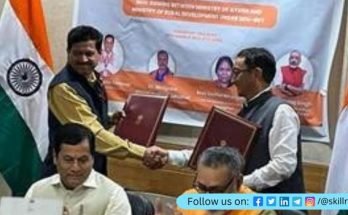New Delhi: Union Minister for Rural Development Sh. Giriraj Singh onboarded 19 Captive Employers, a unique initiative under the Deen Dayal Upadhyaya Grameen Kaushalya Yojana (DDU-GKY) in New Delhi today. Captive employers will train Rural Poor Youth and employ trained youth in their company or subsidiary. The event was also graced by the presence of Union Ministers of State Shri Kapil Moreshwar Patil (Panchayati Raj), Sadhvi Niranjan Jyoti (Rural Development and Consumer Affairs, Food & Public Distribution), and Shri Faggan Singh Kulaste (Rural Development and Steel).
Speaking at the event, Shri Giriraj Singh said India has the potential to emerge as the skill capital of the world and the MoU signed between MoRD and the Captive Employers is the first step towards this aim. In the first phase, 19 Captive Employers are being engaged to train and provide jobs to over 31,000 rural youth.
“We are confident that in the future this number of jobs generated will jump from 30,000 to 1,30,000,” he said.
Shri Giriraj Singh emphasized that the Captive Employer scheme will bridge the gap between job seekers and job providers. The Minister invited suggestions from the participating employers to bring changes in the said arrangement to make it more rewarding and effective. He also emphasized that Ministry as well as the States need to organize meetings with CII, FICCI, and Ph.D. Chamber of Commerce, and MSME Associations.
MoS Shri Kapil Moreshwar Patil, in his speech, said that the Ministry of Rural Development, through its DDU-GKY program and partner Project Implementing Agencies (PIAs), is helping the rural youth find their ground by providing them with employment opportunities and thereby empowering them financially. He also exhorted Captive Employers to inform other industry partners to participate in this scheme and reap rewards in the form of getting a ready supply of skilled Human Resources.
Addressing the gathering, MoS Shri Faggan Singh Kulaste said this is a ‘Rozgar Mela’ (Employment Fair), the more the number of youth and their trust in the scheme gains, the better. “This is the dream of our Prime Minister Shri Narendra Modi and this is the actual Make In India,” he said.
MoS Sadhvi Niranjan Jyoti observed that the captive employment program is a significant initiative of the Ministry. She said, “Every individual is a source of immense possibilities. This initiative will remind our youth of their potential and make them AatmaNirbhar (self-reliant). Also, it will help bridge the human resource needs of the industry.”
During the event, Memorandums of Understanding (MoU) were signed with 19 Employers to engage as captive employers in the ambitious initiative by the Ministry of Rural Development (MoRD) for providing livelihoods to the rural youth under the DDU-GKY program.
The selected CAPTIVE EMPLOYERS will be providing training to rural poor youth in their respective industries, namely, hospitality, apparel & textiles, manufacturing, IT/ITeS, telecom, retail, Power, etc.
More than 31,000 jobs are expected to be provided to rural poor youth through this unique initiative. The latest initiative is aimed at providing hands-on training with the concerned PIA, which is at par with the industry requirements.
At the event, 10 select recently trained candidates, through the program, were also handed out appointment letters by the dignitaries. These candidates have recently completed their On-the-Job Training (OJT) after completion of training.
About Captive Employment:
‘Captive Employment’, is a first-of-its-kind initiative aimed at addressing the vision of a dynamic and demand-based skilling ecosystem catering to the requirements of industry partners assuring sustainable placements for rural poor youth. The initiative is a shot in the arm for the DDU-GKY program, assuring post-training placement of candidates for a minimum of six months with a minimum CTC of Rs 10,000/-. This program will be a big boon for the rural poor to augment their job needs and improve their standard of living. This program shall also contribute to sustainable development goals.



